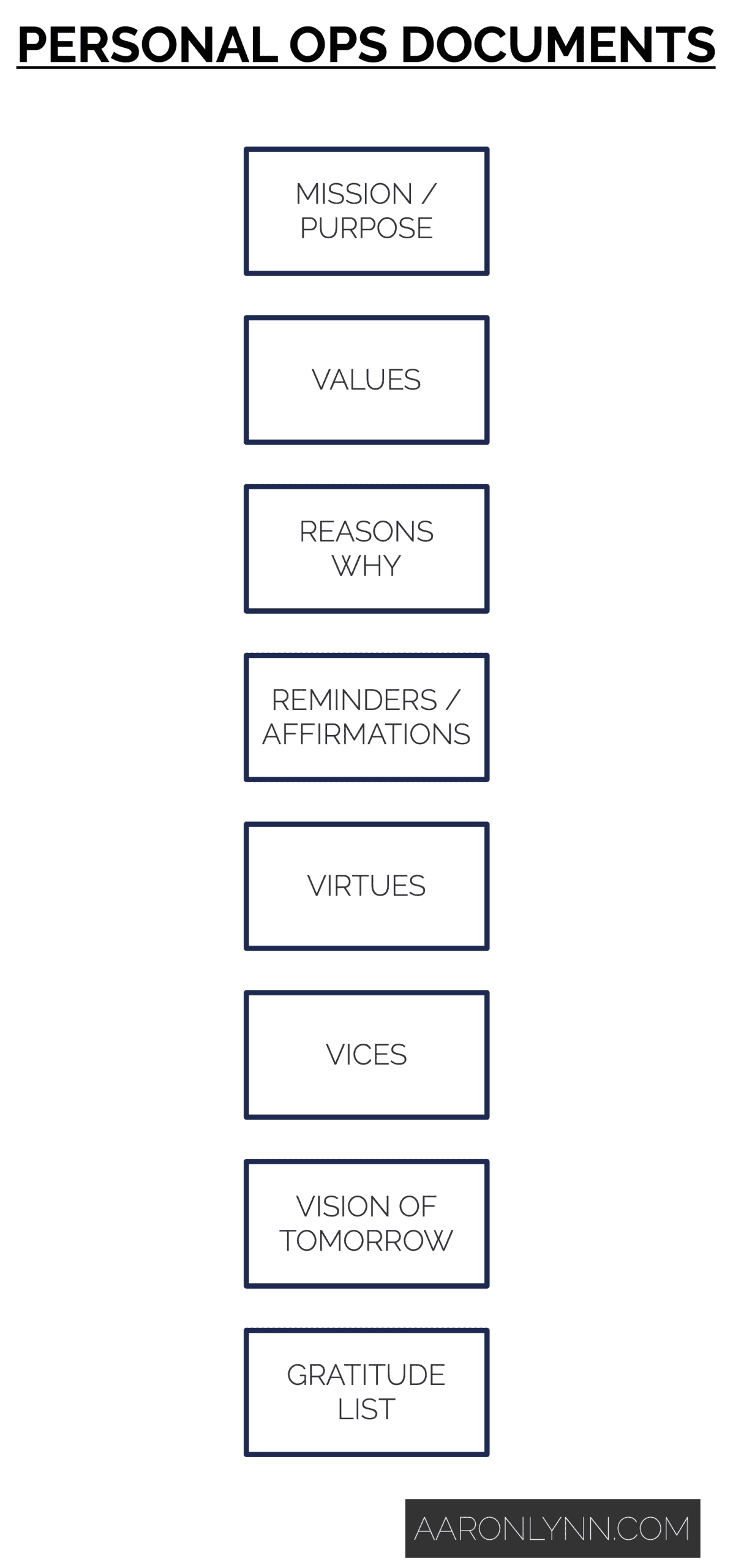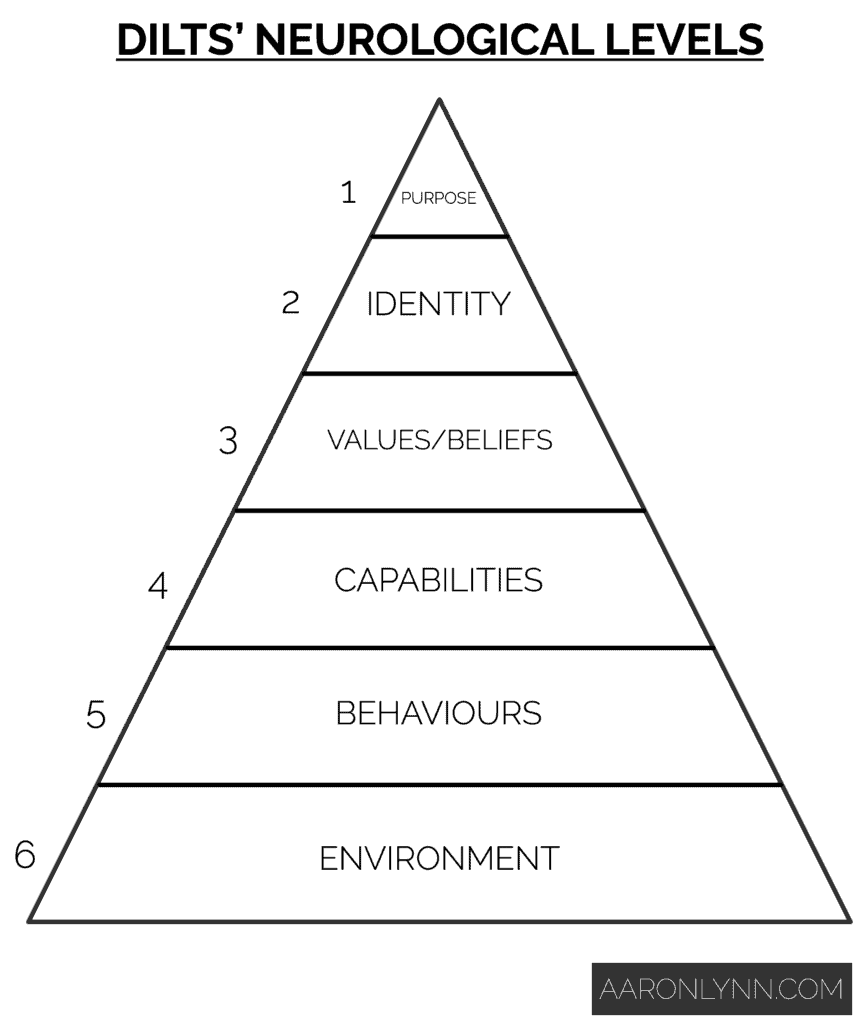
Your personal ops documents represent who you are and the direction of your life at a high level.
They collectively form a system for keeping your life in check and on track. You can think of them as the articles of your personal constitution.
If you want to pursue a life of your own choosing and making, you need written-down personal ops documents to guide you along the way.
Here’s how you can set them up and put them to use.
What Are Personal Ops Documents?
Your personal ops documents are a set of documents that work together to describe your life at a high level.
In order of importance, they are:
- Mission/Purpose.
- List of values.
- Reasons why.
- Select reminders and affirmations.
- List of virtues.
- List of vices.
- Long-term vision or vision of tomorrow.
- Gratitude list.
Why You Need a Set of Personal Ops Documents
Most people wander through life aimlessly.
Not only do they not have many goals, but they have no sense of who they are — their personality and identity are simply an arbitrary amalgamation of influences from childhood, their environment and the media.
Having a set of personal ops documents corrects this.
The simple act of writing down these documents brings clarity to who you are, and gives you the ability to easily change what your life looks like.
Your personal ops documents also help you organise your life at a high level.
They let you reconcile all the things you are and want to be, do, pursue and achieve.
They are a systematic and iterable way to incorporate new ideas into the journey of your life as you come across them.
They act as a system to help you keep your life in check and on track at a high level.
Your personal ops documents also help summarise the high levels of your inner game, or mindset.
Your personal ops documents cover your mission, values, and identity (through reasons why, vision, virtues and vices, reminders and affirmations).
How to Create and Store Your Personal Ops Documents
The logical place to store your personal ops documents is in your personal wiki or journal.
Simply go in there and create a new notebook or tag called “personal ops”.
Then create one of each of these documents:
- Mission/Purpose.
- List of values.
- Reasons why.
- Select reminders and affirmations.
- List of virtues.
- List of vices.
- Long-term vision or vision of tomorrow.
- Gratitude list.
Like this:

Here’s what goes in each document.
1. Mission/Purpose
Your mission or purpose is your entire reason for being.
More than anything, it defines who you are.
It is also one principle in the triad of purpose, hedonism and flow.
Here is my guide to discovering and defining your purpose.
2. List of values
Your values are how you aspire to live and conduct yourself.
Here is my guide to discovering and using your core values.
3. Reasons why
Your reasons why can be thought of as your motivation page.
It is a list of reasons that serve as fuel to you keep going when times are tough, or when you waver from your mission or purpose.
The reasons themselves are usually things that have happened in your life that you want to make up for, stop from happening again, or things that you want to happen in your life.
You can read more about how to uncover your reasons why in my guide to motivation, under Reasons Why.
4. Reminders, affirmations and philosophy
This is a document that contains 10-20 select affirmations, maxims or philosophical points that you choose to live by.
For example, here are some of mine:1Observant readers will note that these are influenced by Stoicism.
- Every circumstance in my life is a result of the choices that I have made and I take responsibility for them, and for any future choices that I make.
- Today I will have to deal with people who are meddling, ungrateful, dishonest, jealous and surly. They are like this because they do not know good from evil, and it makes no difference — they cannot harm me nor stop me from doing what is right.
- Zoom out from myself to the city, country, world, solar system, universe and beyond. Then zoom back in. Observe, do not judge.
There is no right or wrong with these, and they sit distinctly separate from your values or reasons why.
They are simply things that you would like to remind yourself of daily.
5. List of virtues
This is the list of virtues you choose to live by.
6. List of vices
This is the list of vices you choose to avoid in your life.
7. Long-term vision or vision of tomorrow
This is a unique document — simply sit down and write out what you think your life will look like in five years’ time.
Try to be both realistic but also aspirational. By doing so, you will be able to reconcile what you would like to happen with the acceptance that the world may not turn out exactly as you wish.
I recommend dividing it up by your areas of life.
8. Gratitude list
This is a list of five things you are currently grateful for.
These will be updated weekly.
Using Your Personal Ops Documents
Your personal ops documents are to be used every single day.
If you have stored them in your personal wiki or journal, they will sync to your phone, letting you review them whenever and wherever you are:
- As you eat breakfast.
- As you commute to work.
- As you wait for your morning coffee.
I recommend reading over them both in the morning and in the evening.
For the morning, make reading them part of your morning ritual, alongside your outcomes and goals.
If you don’t have a morning ritual, just read over them as early in the day as possible. For example, I usually read mine while I drink my litre of water in the morning.
Doing this early sets the tone of the rest of the day and greatly increases the chances of you have an on-point, good and productive day.
- Your mission reminds you of what you were put on this Earth to do.
- Your values remind you of how you aspire to be.
- Your reasons why remind you why it is you do what you do.
- Your reminders/affirmations, virtues, vices and vision remind you of how you want to live.
- And your gratitude list brings a moment of reflection and gratitude into your life, every day.
In the evening, I recommend reading your personal ops as the first thing in your evening ritual.
Practical personal ops usage
Beyond just having them as reference documents, your personal ops can and should be used practically as well.
The first use is when you need to make a difficult or major decision — use the various documents in your personal ops to help you make that decision.
Your mission/purpose is particularly important for making major decisions. You can simply ask:
Which option best supports my mission and purpose?
And then choose that one.
The second use is for planning goals across cascading timeframes.
Your personal ops are the highest level of organisation in your life, meaning that they directly influence your long-term goals and your standards. In doing so, they also influence and guide your medium-term and short-term goals.
The third practical use for your personal ops is to refer to your lists of vices and virtues daily as part of your daily review.
By checking in on your virtues and vices daily, you can use them as a system for living the way you want.
Review and Maintenance of Your Personal Ops
You may write your personal ops documents for the first time now, but the contents won’t always be the same for the rest of your life.
To review and maintain them, all you need to do is sit down for a few minutes, read over each document and decide if it needs to be updated (or not).
The best way to do this is with cascading timeframes. In particular:
| Timeframe | Review |
| Weekly | Gratitude list |
| Quarterly | Vision of tomorrow Reasons why Reminders, affirmations and philosophy |
| Annually | Mission/Purpose Values |
| Adhoc (As Needed) | Virtues Vices Any document if you’ve undergone a major life change |
What To Do Next
It’s time to set up your own personal ops documents, namely your:
- Mission/Purpose.
- List of values.
- Reasons why.
- Reminders, affirmations and philosophy.
- List of virtues.
- List of vices.
- Long-term vision.
- Gratitude list.
Once you’ve done that, make sure that they flow downwards and align with your standards, your goals and your journal entries.
- Observant readers will note that these are influenced by Stoicism.

